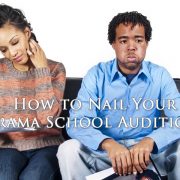 With so many drama schools claiming to be the best in the business, knowing how to choose a drama school can be difficult and seem like a daunting task. But fear not, since on this site, you can find everything and anything related to choosing drama schools and getting accepted.
With so many drama schools claiming to be the best in the business, knowing how to choose a drama school can be difficult and seem like a daunting task. But fear not, since on this site, you can find everything and anything related to choosing drama schools and getting accepted.
We have previously written a lot about drama schools, what are the best drama schools, differences between drama schools and universities, what to do if you don’t get a place and possibly every other topic related to drama schools imaginable. This time, we decided to present some advice from other pros from around the internet.
In this article, we give you top seven tips on how to choose a drama school that’s right for you based on the advice that worked for others. For more thorough tips, I suggest you follow the links and read the full article. Also, remember to browse Acting in London for extensive and detailed articles on the same topics.
RESOURCE: 2017 London Acting Training Directory (all acting options in one place!)
How to Choose a Drama School (7 Tips From Pros)
1. Getting Started
Before you even get into the process of choosing a drama school, you’ll need to know where to start. Starting is always the hardest, and it’s no different when it comes to picking a drama school for your next 3 years of acting training.
Advice from a pro:
Drama teacher, Nicky Hayden, advises that you choose a course that interests you. You’re going to be living and breathing this school for up to three years so you need to be excited by the content. [Read the full article here]
A quick tip to get started:
Before you start trolling through the brochures and course guides of every drama school in your city, it’s a good idea to work out what it is you want to achieve by going to a drama school.
Try making a mind map with all of your ideas and then rank them in order of importance. Check out this simple template from Life Your Way to get started. This way, when you do start researching the schools themselves, you will be able to sift through them in a considered way.
You’ll probably find our Acting for Beginners guide quite useful as well.
2. Do Your Research
 The very first thing you’ll need to do before picking a drama school is to research it. You’re going to use the power of internet to find out as much about the institution as you possibly can, and then some.
The very first thing you’ll need to do before picking a drama school is to research it. You’re going to use the power of internet to find out as much about the institution as you possibly can, and then some.
Advice from a pro:
Sinead Burniston of Drama UK suggests that once you’re clear on your interests, you need to also consider the schools’ reputation. This is probably going to be one of the most expensive things you ever do, so it’s important to ask a lot of questions. [Read the full article here]
To learn more about the drama school’s reputation, here a few suggested questions to consider:
- Find out who is going to be teaching you?
- Are they still working in the profession?
- What is the ratio of teachers to students?
- How many opportunities are there for public performance?
- What casting agents attend their showcases?
- What have previous students gone on to do?
A quick tip to get started:
Once you’ve got the answers to those (and many other) questions, make a ranking system for the drama schools you’ve selected for each criteria. It has to be specifically tailored to you; it shouldn’t be an overall ranking of drama schools, since everybody would be going to RADA then.
When you’ve done with your ranking list, add up the scores to give them a final rank. This will enable you to see which school offers you the best experience overall.
3. Drama School Reputation
 Speaking of drama school reputations, you’ll need to know the difference between universities, accredited drama schools and non-accredited schools. Here’s some quick information for you.
Speaking of drama school reputations, you’ll need to know the difference between universities, accredited drama schools and non-accredited schools. Here’s some quick information for you.
Accredited Drama Institutions
Even though Drama UK has ceased its existence in 2016, their accreditation can still be used as somewhat of a factor. You can view the list of schools accredited by Drama UK on their website and usually, accredited status ensures professional kudos. The institutions listed include professional, intensive and work oriented courses.
Course Types In a nutshell:
- A Professional Course – an accredited professional course means that you will receive expert training from working professionals. This is likely to include permanent and visiting staff.
- An Intensive Course – these are full-time courses that demand full-time commitment much like a job delivering a high number of contact hours for your money.
- A Work Oriented Course – these courses don’t offer ‘academic’ qualifications but instead offer practical lessons and training through commitment to good practice.
Non-Accredited Institutions
Remember that not all drama schools are on the DramaUK list and that doesn’t mean that they’re bad. In fact, there are quite a few drama schools that are non-accredited but yet are considered some of the best places to study in the UK.
If you find a drama school that you really like but it isn’t accredited, don’t discount it immediately. Why not refer to your own ranking system to see where it comes out? For example, if a school is not accredited but the future prospects for good quality work is high then it might be worth considering it seriously.
This where asking the following questions at your research stage is super important:
- What casting agents attend their showcases?
- What have previous students gone on to do?
- Is it ranked on any of Acting in London’s best lists?
- What does your research on this school pulls up?
If well-established casting agents attend the showcases and some of the students have gone on to do great work after graduating then accredited status doesn’t matter really matter.
4. Money Matters
 University education (and that includes drama schools) is expensive. Fortunately, in the UK, we have a thing called Student Loan Company that can help you fund your studies in full. Many drama schools also offer scholarships and bursaries but it’s very competitive so you should not rely on winning one in order to fund your studies.
University education (and that includes drama schools) is expensive. Fortunately, in the UK, we have a thing called Student Loan Company that can help you fund your studies in full. Many drama schools also offer scholarships and bursaries but it’s very competitive so you should not rely on winning one in order to fund your studies.
Susan Elkin, education and training editor of The Stage advises studying part-time so that you can work at the same time. [Read the full article here]
However, for international students, there might be some visa restrictions so make sure you’re aware of what you can and can’t do legally before applying for part-time study.
Here’s our article on how to fund your acting training so you know a little more about this.
5. Auditions
 Before you get accepted into a drama school, you’ll have to go through at least one round of auditions and an interview.
Before you get accepted into a drama school, you’ll have to go through at least one round of auditions and an interview.
When you’ve done ranking your schools, do not put all your eggs into one drama school’s basket. You should audition for at least five schools, according to advice from Susan Elkin. This will enable you to get a taster of different schools before accepting a place if one is offered.
However, Susan warns that audition fees are costly and can be priced anywhere between £35 and £100 each.
Some schools include a full taster day in this cost so you need to work out if it’s worth it. Not just for the money, advises Susan, but also your time if you factor in the possibility of call-backs.
Here’s more information on how to audition for drama schools and what to expect.
6. Fools Rush In
 Do not be in a rush to pick a drama school where you’ll spend your next 3 years studying acting.
Do not be in a rush to pick a drama school where you’ll spend your next 3 years studying acting.
Places at drama school are often highly coveted and more often than not, aspiring actors are likely to face a lot of rejection. However, if you are offered a place, you shouldn’t automatically accept it out of panic. Susan recommends that you trust your gut feeling and take your time
Here’s Susan Elkin’s top tip on this matter:
“Ultimately you have to feel this is a place where you feel comfortable and inspired. If it isn’t, keep looking.” [Read the full article here]
7. Get Proactive!
 The most important thing you can do while waiting to get into a drama school is to stay proactive as an actor and a potential drama school student. It will not only benefit you as a performer, but also in getting attention from drama school tutors, the board and some important people later down the road.
The most important thing you can do while waiting to get into a drama school is to stay proactive as an actor and a potential drama school student. It will not only benefit you as a performer, but also in getting attention from drama school tutors, the board and some important people later down the road.
Get into a habit of staying proactive as an actor. Right now, you need to do this to get accepted into a drama school and know a lot more about your potential place of study.
Here are some quick tips for you:
- 1. If you can, go to see current students’ productions at the schools on your shortlist and find opportunities to talk to students and teachers.
- 2. If it’s not possible to get to the productions, why not follow the drama schools on social media so that when opportunities come up to engage with staff and students, you’ll be front of the queue.
- 3. As well as stalking your favourite drama schools on Twitter, Instagram and Facebook, make social media your best friend and helpful research tool.
If you don’t know all the contacts, social media pages and other information about your drama schools, take a look at our London Acting Training Directory which has most of the information about all places that teach acting in London.
Follow acting boards on Pinterest like these ones:
- Acting by Craig Simons – he’s not a social media guru so this board might lose momentum but right now there’s plenty of cool articles and helpful pins to get inspired by!
- Playing Different Chords// by Emma – there’s plenty of advice and info on this board by an established pinner including everything from what casting agents are looking for to Broadway beauty tips.
- Acting in London Board – we occasionally pin some interesting articles, quotes for actors and more stuff.
Join groups and networks on Facebook like this one:
- London Acting Network – great for casting calls but an invaluable resource for networking and picking the brains of actors in the biz about the drama schools they went to!
Follow blogs from existing drama students like these ones:
- Another London Actor – follow the journey and pick up some tips!
- Actors and Performers – great posts on everything to do with performance art, including drama school advice!
There’s plenty of info out there but sometimes it can be really daunting. That’s why it’s so important to allow yourself plenty of time to do the research you need so that when you part with that massive wad of cash, you’re getting the best course and an experience that will last a life time.





